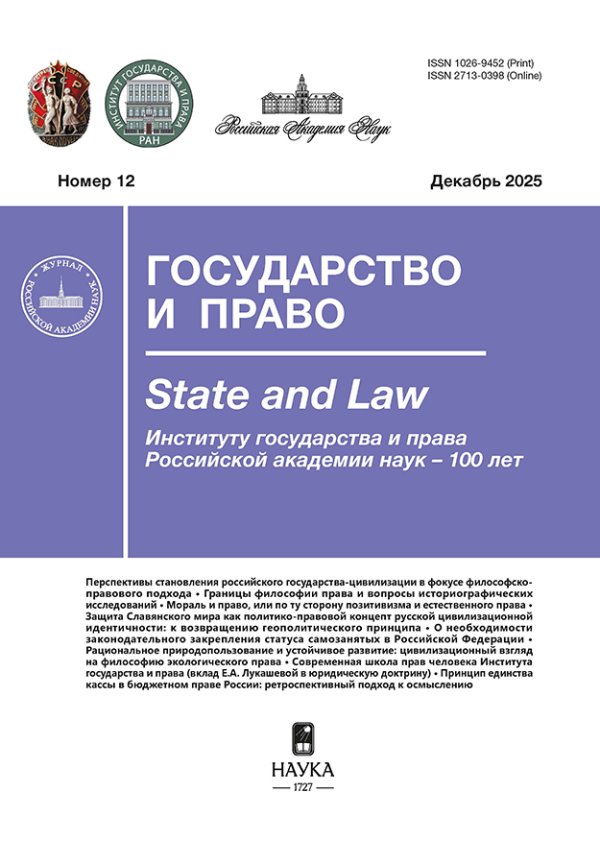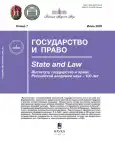Правовая система ЕАЭС: суверенитет государств-членов и «наднациональное» право
- Авторы: Тюрина Н.Е.1
-
Учреждения:
- Казанский (Приволжский) федеральный университет
- Выпуск: № 7 (2025)
- Страницы: 140-148
- Раздел: В ГОСУДАРСТВАХ – ЧЛЕНАХ ЕВРАЗИЙСКОГО ЭКОНОМИЧЕСКОГО СОЮЗА
- URL: https://journal-vniispk.ru/1026-9452/article/view/306371
- DOI: https://doi.org/10.31857/S1026945225070157
- ID: 306371
Цитировать
Аннотация
Углубление интеграционных процессов в рамках ЕАЭС составляет важнейшую текущую задачу для развития сотрудничества в рамках этой региональной организации. Сохранение государственного суверенитета в условиях, характеризующих ЕАЭС как организацию наднационального типа, является ключевым фактором для продвижения в заданном направлении. В статье рассматриваются роль государства по отношению к центральному компоненту правовой системы ЕАЭС – праву Союза (международным договорам с третьими государствами и актам органов ЕАЭС) и некоторые проблемы формирования идеологического компонента данной системы.
Об авторах
Н. Е. Тюрина
Казанский (Приволжский) федеральный университет
Автор, ответственный за переписку.
Email: tyurina.natal@yandex.ru
420008 г. Казань, ул. Кремлевская, д. 18
Список литературы
- Алексеев С. С. Право и правовая система // Правоведение. 1980. № 1. С. 27–34.
- Ануфриева Л. П. О некоторых теоретических подходах к праву евразийской интеграции и ее институализации // Lex russica. 2017. № 9. С. 116–126.
- Бекяшев К. А. ЕАЭС: международная (межгосударственная) организация или международное (межгосударственное) интеграционное объединение? // Евразийский юрид. журнал. 2014. № 11. С. 14–16.
- Бирюков П. Н. Международное право. Углубленный курс. М., 2014.
- Ватыль В. Н. Наднациональный уровень регулирования в ЕАЭС: институционально-нормативное измерение // Русская политология – Russian Political science. 2019. № 2 (11). C. 25.
- Войников В. В., Артеменко Т. Д. Право ЕЭК на обращение в суд ЕАЭС: перспективы развития и опыт ЕС // Московский журнал междунар. права. 2023. № 2. С. 21–37.
- Глазьев С. Ю., Кефели И. Ф. К вопросу об идеологии Евразийского экономического союза // Евразийская интеграция: экономика, право, политика. 2022. № 1. C. 10–21.
- Гаврилов В. В. Понятие национальной и международной правовых систем // Журнал росс. права. 2004. № 11. С. 98–112.
- Гусев А. В., Савоськин А. В., Галицков В. А. Значение решений Суда Евразийского экономического союза для правового пространства стран-участниц и национальных судов // Вестник Уральского юрид. ин-та МВД России. 2022. № 1. С. 106–111.
- Изотов В. С. ЕАЭС: от межгосударственных механизмов к эффективной наднациональности // Механизмы принятия наднациональных решений в ЕАЭС: вклад в стратегическое планирование и антикризисное управление: экспертный докл. к XXIV Ясинской (Апрельской) междунар. науч. конф. по проблемам развития экономики и общества, Москва, 2023 г. М., 2023. С. 122–138.
- Капустин А. Я. Договор о Евразийском экономическом союзе – новая страница правового развития евразийской интеграции // Журнал росс. права. 2014. № 12. С. 98–107.
- Нешатаева Т. Н. К вопросу о создании Евразийского Союза: интеграция и наднационализм // Междунар. правосудие. 2014. № 2 (10). С. 57–70.
- Нешатаева Т. Н. Наднационализм: развитие внутреннего права ЕАЭС // Росс. правосудие. 2019. № 5. С. 38–57.
- Нерсесянц В. С. Сравнительное правоведение в системе юриспруденции // Государство и право. 2001. № 6. С. 5–15, 17.
- Пантин В. И. Идеологические основы евразийской экономической интеграции // Вестник РУДН. Сер.: Международные отношения. 2022. Т. 22. № 1. С. 17–29.
- Пименова О. И. Правовая интеграция в Европейском союзе и Евразийском экономическом союзе: сравнительный анализ // Вестник международных организаций. 2019. Т. 14. № 1. С. 76–89.
- Скуратов Ю. И. Евразийский конституционализм: понятие и содержание // Росс. юрид. журнал. 2021. № 1. С. 54–68.
- Тихомиров Ю. А. Закон и формирование гражданского общества // Сов. государство и право. 1991. № 8. С. 24–32.
- Тункин Г. И. Международное право. М., 1982.
- Фельдман Д. И. Система международного права. Казань, 1983.
- Чайка К. Л. Роль общих ценностей Евразийского экономического союза в становлении и развитии права интеграционного объединения // Журнал росс. права. 2020. № 5. С. 148–158.
- Шумилов В. М. Всемирная торговая организация. Право и система: учеб. пособие. М., 2006. С. 11.
- Behr T., Jokela J. Regionalism & Global Governance: The Emerging Agenda. P. 13. URL: https://institutdelors.eu/wp- content/uploads/2020/08/regionalism_globalgovernance_t.behr-j. jokela_ne_july2011_01-3.pdf
Дополнительные файлы










